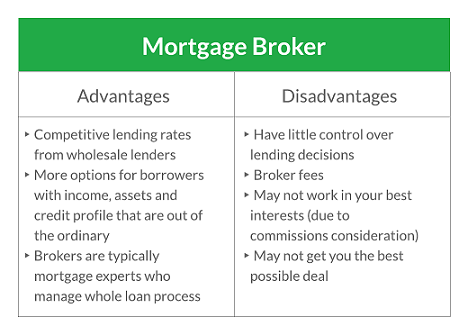10 Apps to Help You Manage Your Mortgage Brokers Northern Beaches
Some Known Questions About Reasons To Work With A Direct Mortgage Lender Versus A ....

But it actually depends who you utilize and whether another entity can do better for your specific loan scenario. For example, a broker may have access to excellent re-finance rates thanks to a rates special with an offered wholesale lending partner. While licensing requirements do differ by states, home loan brokers must be certified and complete a criminal background check consisting of fingerprinting.

In addition, brokers need to generally finish pre-license education and some needs to get a bond or meet particular net worth requirements. Yes, mortgage brokers are managed on both the federal and state level, and need to comply with a big number of rules to carry out company. In addition, consumers have the ability to search for broker records via the NMLS to ensure they are licensed to conduct company in their state, and to see if any actions have actually been taken versus them in the past.
Normally not. Mortgage brokers work with banks and loan providers that ultimately money your loan. These banks will either keep the loan on their books or offer it off to another business that might service the loan. Basically, there's a likelihood your loan servicer might change once or two times after your loan closes.
The 2-Minute Rule for Mortgage Brokers Are Fighting Back With Lower Rates, Less ...
And regardless of the ups and downs that come with realty, they will probably continue to play an active function in the home mortgage market because they provide an unique service that big banks and cooperative credit union can't mimic. So while their numbers might change from time to time, their services should constantly be available in one way or another.
You may be advised one by your property agent or by a good friend or member of the family. Everyone seems to understand one. Or you can look for out a home mortgage broker in your location by reading online evaluations. It might be smart to work with somebody local who you can take a seat and meet rather than one not in your immediate location.
A home loan broker acts as an intermediary who brokers mortgage loans on behalf of people or businesses. Typically, banks and other lending organizations have offered their own products. As markets for home mortgages have ended up being more Additional reading competitive, nevertheless, the role of the mortgage broker has ended up being more popular. In numerous industrialized home mortgage markets today, (particularly in Canada, the United States, the United Kingdom, Australia, New Zealand and Spain), home loan brokers are the biggest sellers of home loan items for lenders.
The Ultimate Guide To Mortgage Broker Definition - Investopedia
Mortgage brokers in Canada are paid by the lending institution and do not charge costs for excellent credit applications. Numerous home loan brokers are regulated to guarantee compliance with banking and finance laws in the jurisdiction of the consumer. The extent of the policy depends upon the jurisdiction. Banking activities can be divided into the following: Retail banking: dealing straight with people and small companies Company banking: providing services to mid-market business Corporate banking: directed at large organization entities Land home loan banking: it specializes in stemming and/or serving land home loan loans Personal banking: offering wealth management services to high-net-worth individuals and families Financial investment banking: connecting to activities on the financial markets Most banks are profit-making, personal business, however, some are owned by government, or are non-profits.
supervising industrial banks, or managing the cash rate of interest. Central banks typically offer liquidity to the banking system and function as the loan provider of last resort in the event of a crisis. The nature and scope of a home mortgage broker's activities differ with jurisdiction. For example, anyone offering home mortgage brokerage in the UK is offering a regulated monetary activity; the broker is accountable for making sure the recommendations is suitable for the customers' situations and is held financially liable if the recommendations is later revealed to be faulty.
The work undertaken by the broker will depend upon the depth of the broker's service and liabilities. Typically the following jobs are carried out: marketing to attract customers evaluation of the borrower's circumstances (Mortgage truth find forms interview) this may consist of assessment of credit history (normally obtained by means of a credit report) and affordability (validated by earnings paperwork) evaluating the marketplace to discover a home loan product that fits the client's needs.
Mortgage Brokers Vs Banks - Which One Is Better? - The ... - Questions
The staying 32% of loans is retail done through the loan provider's retail channel, which suggests the lending institution does not go through a broker. The home loan broker market is regulated by 10 federal laws, 5 federal enforcement agencies and 49 state laws or licensing boards. [] The banks have actually used brokers to outsource the task of finding and certifying borrowers, and to outsource a few of the liabilities for scams and foreclosure onto the pioneers through legal contracts. [] Throughout the process of loan origination, the broker gathers and processes paperwork connected with mortgaging realty.
